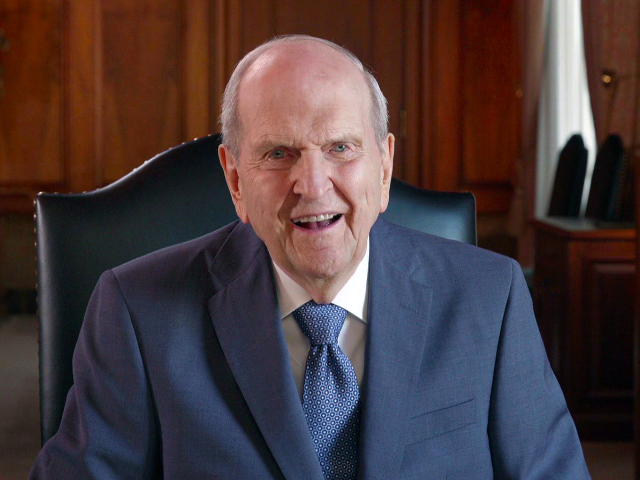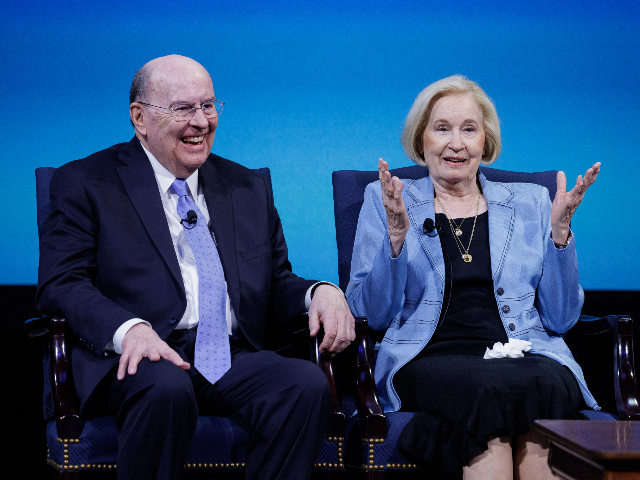This story appears here courtesy of TheChurchNews.com. It is not for use by other media.
By Rachel Sterzer Gibson, Church News
Lori Newbold loves her job.
She recognizes that not everyone wakes up each morning eager to go to work. “But I do,” she told the Church News. “I’m excited because of who I get to be with.”
For the past 18 years, Newbold has worked for Seminaries and Institutes of Religion, both as a seminary teacher and in the training division for seven years. Currently, she teaches at the Salt Lake Institute of Religion adjacent to the University of Utah.
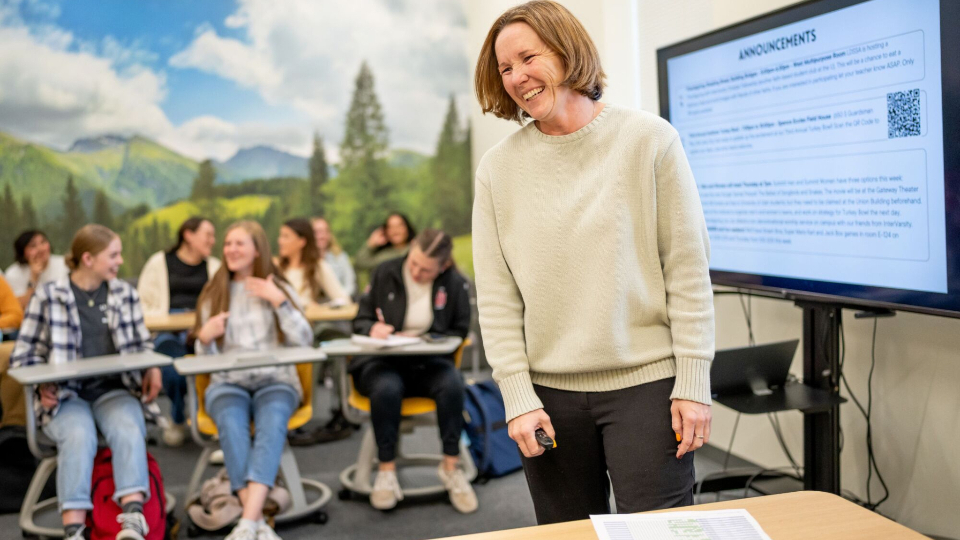
Institute-Newbold
Lori Newbold instructs a class called “Involving the Savior in Your Mental and Emotional Health” at the Salt Lake Institute of Religion adjacent to the University of Utah in Salt Lake City on Wednesday, November 15, 2023. Photo by Spencer Heaps, courtesy of Church News.Copyright 2023 Deseret News Publishing Company.Working with the young adults of the Church “is an absolute joy,” Newbold said. “I feel like I gain energy going to work every day.”
President Russell M. Nelson recently issued special invitations to youth and young adults throughout the Church. In two videos released globally, the Prophet promises a long list of accompanying blessings, which Newbold keeps posted on her office wall. The promised blessings include deepened conversion to Jesus Christ, feeling more of Heavenly Father’s great love, more opportunities for faithful friends and a sense of belonging, and feeling more joy — right now.
His invitation? Attend seminary and institute.
Newbold said she loves seeing those blessings fulfilled in the lives of students. “I am continually amazed at all the Lord does to express love for and confidence in the rising generation,” she said. The invitation issued by President Nelson “is just another example to me of how much Heavenly Father loves His young adults and how much He believes in them.”
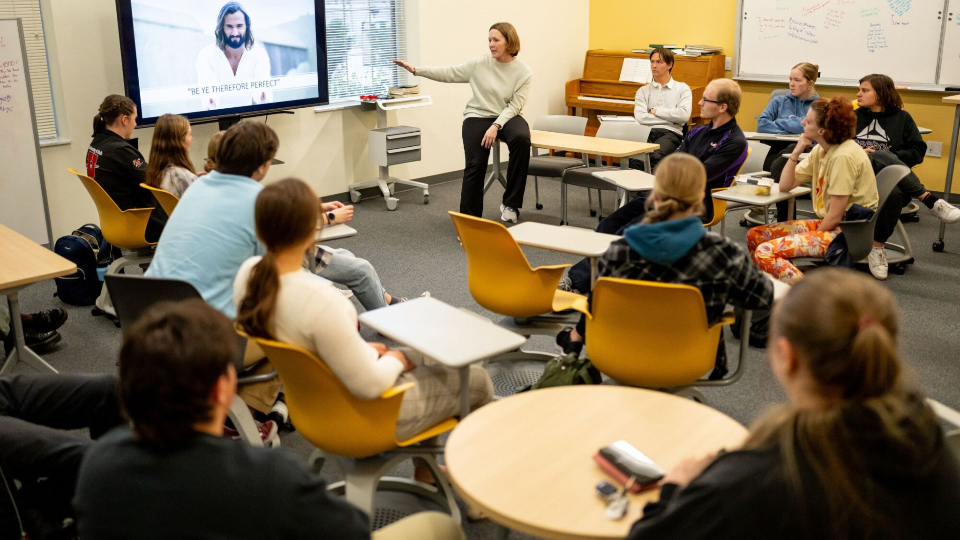
Institue-Newbold
Lori Newbold instructs a class called “Involving the Savior in Your Mental and Emotional Health” at the Salt Lake Institute of Religion adjacent to the University of Utah in Salt Lake City on Wednesday, November 15, 2023. Photo by Spencer Heaps, courtesy of Church News.Copyright 2023 Deseret News Publishing Company.This Generation of Latter-day Saint Young Adults
National media have featured news about the declining spirituality of today’s young adults, colloquially known as Generation Z. The Deseret News reported last year that “Americans between the ages of 18 and 29 aren’t going to church in numbers like their grandparents and great-grandparents did, and the numbers seem to decline every year” (“Perspective: Young adults are losing their religion. Are their parents to blame?” April 23, 2022).
A poll conducted by Deseret News and Marist Poll found that only 21% of young adults report going to church once or twice a month. And slightly more than a quarter of those young adults say they pray daily, compared to nearly 70% of Americans who are 60 or older.
While a decrease in spirituality and religiosity might be true among young adults in the world, there’s a bifurcation among them and the young adults of The Church of Jesus Christ of Latter-day Saints, noted Keith Burkhart, director of strategy and audience support for Seminaries and Institutes of Religion.
Over the last two years, institute enrollment has grown by over 57,000 students. Between the ages of 18 and 30, 95% of Church-attending young adults will also attend institute.
In the Worldwide Devotional for Young Adults on Sunday, November 19, Elder Quentin L. Cook of the Quorum of the Twelve Apostles reported that youth and young adults are not less active or leaving the Church in higher numbers than in the past, as some have speculated. “The number of missionaries called to serve has significantly increased. The percentage of Church participation for the rising generation shows a continuous upward trend. Moreover, the number of young adults attending institute has also been increasing,” he noted.
In his role, Burkhart has helped collect and work with research done by the Church about young adults. Researchers interviewed thousands of young people around the world from different demographics — “not just the same 10 kids that are always in class.”
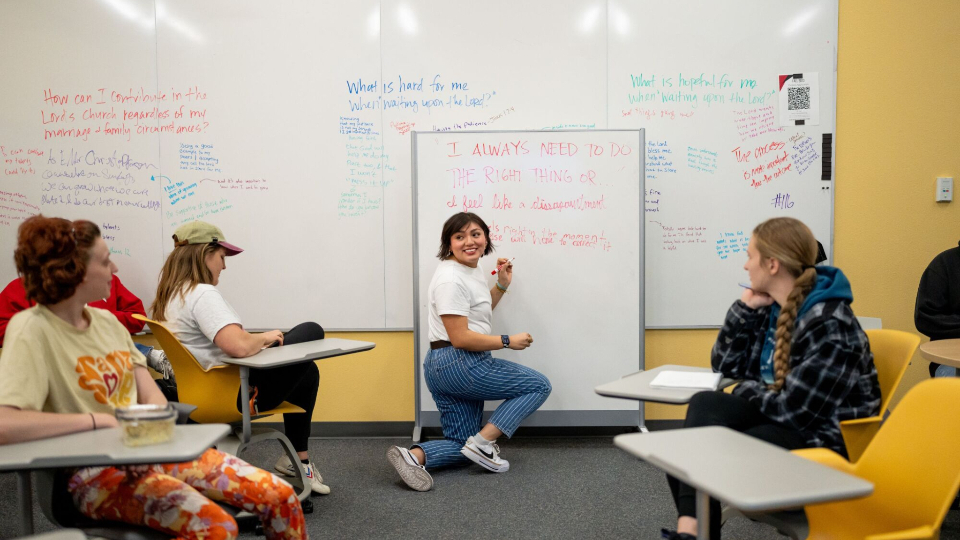
Institute-Newbold
Khayla Murphy writes on a white board during a class at the Salt Lake Institute of Religion adjacent to the University of Utah in Salt Lake City on Wednesday, November 15, 2023. Photo by Spencer Heaps, courtesy of Church News.Copyright 2023 Deseret News Publishing Company.The No. 1 thing Latter-day Saint young adults want? A deeper connection to Jesus Christ.
Chad H. Webb, administrator of seminaries and institutes, commented that today’s young adults desire to feel God’s love, to have a relationship with Him and to learn about Him. “They have questions of the soul and are looking for answers they can trust that are relevant to their circumstances and needs. They want to be with others who share their beliefs and values. They want to belong to the cause of Christ.”
Added Burkhart, “They want to feel loved by God, not just in a general way, but in a very personal way. And they hope that the resources and the services — the things that we provide as a Church — help them do that.”
Words Newbold used to describe today’s young adult Latter-day Saints included “extremely resilient,” “hungry for the gospel and real, practical application,” “unafraid of other people’s weaknesses and mistakes” and “seekers of truth.”
Most importantly, “they love Jesus Christ,” Newbold said. “They want to follow Jesus Christ, and they are figuring out how to have a relationship with Him and … come to know Him and His goodness. It’s so sweet to be a part of.”
Anyone who doubts the spirituality and capability of today’s young adults in the Church should spend five minutes in one of her classes, Newbold said. “They teach me things out of the scriptures I’ve never seen before.”
As he’s attended institute classes around the world — from Utah to Africa to the Philippines — Burkhart said two things usually happen. First, “I almost fall out of my chair because of their amazing insights.” Second, “I cry almost every single time.”
Latter-day Saint young adults have “kind, loving hearts, and they’re hoping the Savior will help them with a really, really difficult world as we prepare for the Second Coming of the Savior,” he said.
In 2018, President Russell M. Nelson told the youth they have the capacity to be smarter and wiser than any previous generation (“Hope of Israel,” Worldwide Youth Devotional, June 3, 2018).
“I interact with [young adults] every day and believe every word that the God of Heaven is saying about His young adults,” Newbold said. “They are exactly who He says they are. And He is fulfilling the promises He has made to them through His Prophet.”
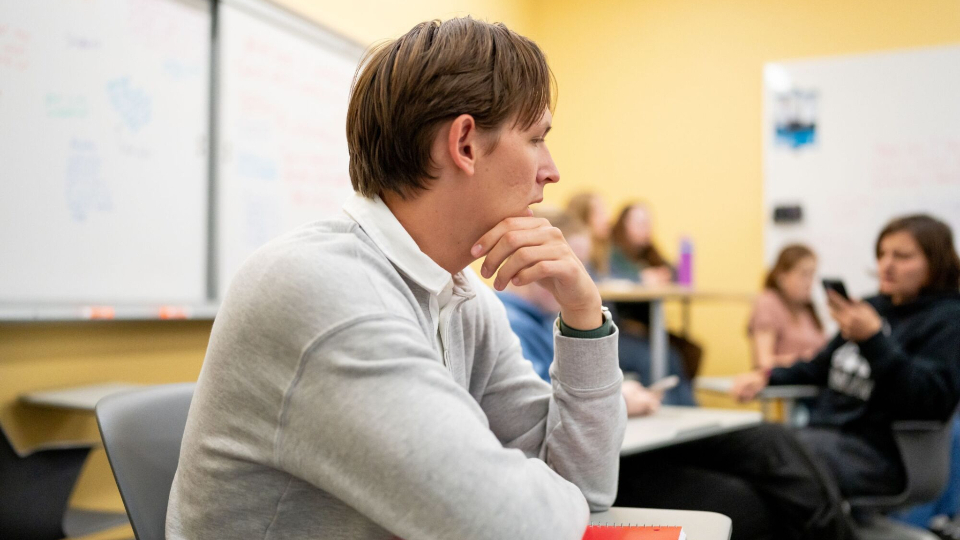
Institute-Newbold
Parker Mitchell sings a hymn with others in a class at the Salt Lake Institute of Religion adjacent to the University of Utah in Salt Lake City on Wednesday, November 15, 2023. Photo by Spencer Heaps, courtesy of Church News.Copyright 2023 Deseret News Publishing Company.Why an Increase in Institute Enrollment?
Simply stated, Webb said they are seeing an increase in enrollment because “we are doing better at meeting the needs [of young adults].”
In the last few years, seminary and institute programs have strived to make better use of technology and online resources, such as videos, podcasts, apps and websites; to improve cooperation and coordination with local leaders, parents and teachers; and to provide more opportunities for service and leadership — both in and out of the Church.There has been a concerted effort to apply the lessons learned from their research, explained Burkhart, an initiative called “Innovate Institute.”
To help provide greater relevance, belonging and accessibility, many institutes renovated classrooms to include group seating and added floor-to-ceiling whiteboards to promote peer-to-peer discussions. They began offering digital experiences via social media. They became more flexible about the courses offered, adapting many of them to local needs. As an example, Newbold is teaching a course about involving the Savior in mental and emotional health, a course that did not exist a few years ago.
When going through feedback, Burkhart said program administrators tried to organize the information into things that were “within our lane,” or sphere of influence, or not. For things that were “not in our lane,” they tried to think if there were new, innovative ways or resources to help.
For example, while religious educators are not qualified to provide counseling to students regarding mental or emotional health issues, institute could reach out to the Church’s Family Services and ask if a counselor could be available at the institute or provide a workshop on coping with anxiety and depression. They could partner with Employment Services to provide resources at the institute for students looking for help finding a job.
Newbold shared Alma 49:11, which records how the Nephites “alter the management of affairs” in order to defend themselves against the Lamanites. “They had to do something different,” Newbold said. In the end, “the Laminates couldn’t keep up with them.”
In Newbold’s mind, that’s similar to what Seminaries and Institutes of Religion has tried to do in the classroom experience, teaching and activities provided through institute — “We had to ‘alter the management of affairs’ to better meet the needs of young adults.”
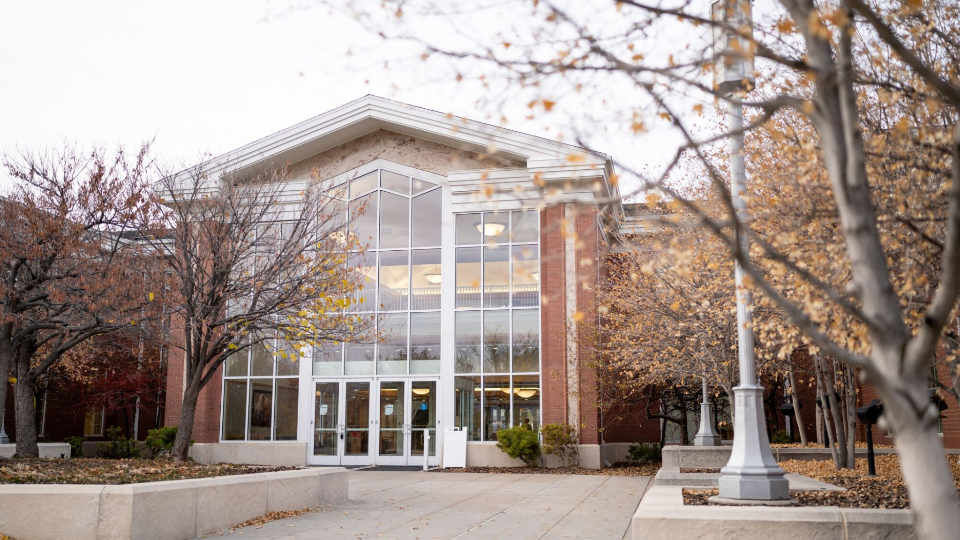
Institute-Newbold
The Salt Lake Institute of Religion adjacent to the University of Utah in Salt Lake City is pictured on Wednesday, November 15, 2023. Photo by Spenser Heaps, courtesy of Church News.Copyright 2023 Deseret News Publishing Company.The Blessings of Institute
In the Prophet’s video, he promises: “If you want to know the truth about who you really are, attend institute. If you want to know the purpose of life, attend institute. If you are to stay on the covenant path, attend the institute. If you want to learn how to let God prevail in your life, attend institute. If you want to be a peacemaker, attend institute.”
Institute, he said, can provide young adults with inspiring instructors, faithful friends and a feeling of belonging.
For many, those blessings are already becoming a reality. During a devotional for youth and their parents and leaders throughout the Utah Area in October, Elder Clark G. Gilbert, Church commissioner of education and a General Authority Seventy, shared a video where students from several universities and colleges shared their feelings about attending institute.
Copyright 2023 Deseret News Publishing Company.
